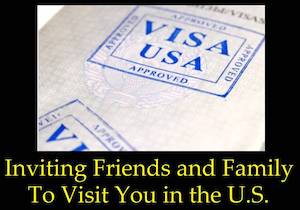B Visa (Tourist / Visitor Visa)
B Visa (Tourist / Visitor Visa)
Immigration Policy
Every foreigner who is lawfully admitted into our country is admitted as an “Immigrant,” or admitted as a “Nonimmigrant.” People who are admitted as Immigrants have a stated objective of moving in to the United States permanently – they want to make this their home country. People who are admitted as nonimmigrants are seeking temporary entry for some short term purpose such as visiting the Grand Canyon, getting a medical procedure, or spending a few wild days and nights in Las Vegas. A B Visa is a nonimmigrant visa.
The Unites States is a powerful, prosperous, and relatively safe country. We have our internal gripes and discord, but those pale in comparison to the size, scope, depth, and horror of types of internal gripes that are unfortunately quite common in the rest of the world. Because of this it is presumed by immigration authorities that every person seeking entry into the US has an intention to immigrate, even those who state a short term purpose such as those outlined above. A foreigner seeking a nonimmigrant visa such as a B visa must be able to overcome this presumption of immigrant intent to the satisfaction of consular staff or the nonimmigrant visa will be denied.
The State Department has an enormous amount of discretion over who it does and does not allow to enter the United States. When an application for nonimmigrant visa is denied at a consulate or embassy, there is no appeal process, and no supervisor to complaint to. There are many reasons that a nonimmigrant visa application might be denied (for example where the foreigner has a criminal record, or infectious diseases) but by far the most common reason that nonimmigrant visa applications are denied is the foreigner’s failure to overcome the presumption that he or she intends to immigrate.
Current B Visa Process
Per the USCIS itself, the process is very simple, the foreigner must complete an online application for nonimmigrant visa and upload a photo as part of that process, then print out the first page. The foreigner must then schedule an interview at the embassy or consulate, taking that first page with them. Notice that, in spite of the hundreds of immigration firm web pages devoted to crafting the perfect “Invitation Letter,” no invitation letter at all is required. This is much the same all over the world, for example, no one needs an invitation letter from a friend in Mallorca to enter Spain and go hiking in the Pyrenees.
Of course during the interview, the foreigner must overcome the presumption of immigrant intent (the presumption that once he or she gets into the U.S. they won’t go home.) This is normally accomplished by the foreigner showing significant ties with the home country that won’t be destroyed by the time spent in the U.S. and a lack of things in the U.S. that might make them want to forsake the ties to the home country. For example, a great job in the home country is a significant tie to that country, but if the job will be lost if the foreigner stays in the U.S. for six months, the job in the home country will be discounted as a tie to the home country.
Overcoming the presumption of immigrant intent becomes quite difficult where the home country is a terrible mess, or where there are many or very close family members in the U.S.. This is particularly the case where the foreigner, now a grandparent and retired from working, seeks to enter the U.S. to “visit” their child and grandchild. Once could easily see how that grandparent would be quite reluctant to leave the next two generations alone in the U.S. and go back to the home country, likely to never see those two generations of issue again.
Tips
The foreigner presenting for an interview should be prepared to present the interviewing officer with evidence to assist in overcoming the presumption of immigrant intent, for example:
- Proof of ownership of lease of property in the home country;
- Evidence of other businesses or holdings in the home country;
- Documentation of the temporariness of the visit;
- Proof of the foreigner’s ability to take the trip without loss of lease, job, and ability to pay for accommodation and intended visits.
- An itinerary of places the Foreigner intends to visit or stay
- Proof of a job or other important avocation that the foreigner will need to get back to.
- Proof of family members left behind in home country, especially of those family members are dependent on the foreigner in one way or another.
- A round trip ticket
Events that the foreigner is scheduled to attend in the home country, e.g. already enrolled in and paid for classes in the fall.
What Lawyers Can do to Help You with the Process
If you have read this entire post, you already have the majority of what lawyers can effectively help you and your intending foreign visitor with. We won’t be traveling to the embassy or consulate to assist in the interview and there would be no appeal to take if we did and it didn’t go well. There is a mechanism to help you write letters to both the intending visitor and the embassy or consulate which may be taken to the interview as evidence reinforcing the message of nonimmigrant intent, but the help those letters would provide would be negligible toward overcoming the presumption of immigrant intent when you have, for example, a retired grandparent in a third world country who owns no property and has no other children seeking to enter the U.S. for a “temporary” visit with their only child and grandchild.
Please feel free to contact us with your immigration needs.











